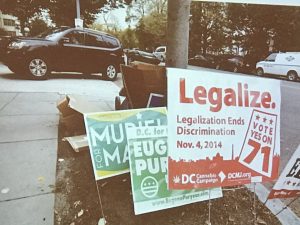Marijuana legalization hit stone walls in New York and New Jersey this week and another effort died in New Hampshire. In Vermont, legislation to establish a commercial marijuana market faltered, too. Four states failed. Tiny windows of opportunity may still be open, but passing bills doesn’t appear possible before the end of this year’s legislative session.
It was the second year New Jersey Governor Phil Murphy tried to implement marijuana legalization through the legislature. In New Jersey, marijuana industry ties run deep. Governor Murphy’s first chief of staff was the lobbyist for the New Jersey Cannabis Industry Association.
SAM (Smart Approaches to Marijuana) worked for these defeats through its SAM Action division. Behind the scenes, SAM warns legislators in state and federal governments against marijuana legalization. SAM does not accept money from the pharmaceuticals industry, as pot lobbyists claim.
Pro-pot politics is faltering in Illinois and Connecticut, even though both states’ governors support legalization. Governor Pritzker’s cousins invest in cannabis businesses. Senator Richard Durbin, the Illinois NAACP and Illinois Catholic Bishops oppose legalization.
Learning from mistakes of other states
As Illinois State Representative Marty Moylan said, “It’s been a failed experiment in every other state that has made the move to legalize marijuana.” He wrote a letter to the Chicago Tribune, “Slow the push for legal pot.” A few days ago, the Chicago Tribune wrote another editorial, also calling for the state to slow down.
Legalization involves advertising and stores which push the public tolerance by locating close to homes and schools. Vermont allows personal possession of two mature marijuana plants, a policy best described as decriminalization. Although national polls usually don’t give the public the option of decriminalization, decriminalization reflects what most people want when they vote for legalization.

Vermont’s policy started July 1, 2018 and two months later, Keith Cushman smoked marijuana. drove and caused a fatal crash. A relative of one of the victims called for a better test to determine whether motorists are impaired by marijuana. Vermont’s decriminalization does not give the state enough power to test and prevent stoned driving.
Parents Opposed to Pot believes the dangers of using marijuana far outstrip the dangers of an arrest for marijuana possession. Alex Berenson’s new book, Tell Your Children the Truth about Marijuana, Mental Health and Violence, explains the mental health dangers.
Traffic deaths and violent crimes went up in the first four states to legalize marijuana. Drunk drivers never went away, and more people began combining alcohol and marijuana before driving.
Big lies permeate propaganda to legalize marijuana
Legalizers suggest or claim:
- Massive numbers of people are in jail for simple marijuana possession, which is completely untrue. John Pfaff wrote a book about the reasons for mass incarceration, finding that prisons are not full of nonviolent drug offenders.
- Since “Prohibition” has failed, legalization will work and black markets will go away. In California, which legalized pot for medical and recreational reasons, about 80% of the market is sold on the black market and the state has failed to get even half of the promised revenue.
- The dangers of alcohol will go away if marijuana becomes legal, since many people will find marijuana is a safer alternative to alcohol.
- Legalization will bring “social justice.” People who advocated legalization for social justice reasons suggest that racial discrimination will vanish through the legalization of marijuana.

In the 2014 legalization campaign for Washington, DC, advocates claimed that legalizing marijuana would end discrimination. It hasn’t been true.
We believe that disadvantaged populations will be harmed more with legalization. SAM specifically highlights the social justice problems with the legalization of pot. Teresa Haley, president of the Illinois NAACP, and other NAACP chapters take stands against legalizing pot.
Unfortunately, public policy doesn’t warn people of the mental health risks involved in using pot. We need a new Parents Movement to head off the misconceptions about marijuana.

